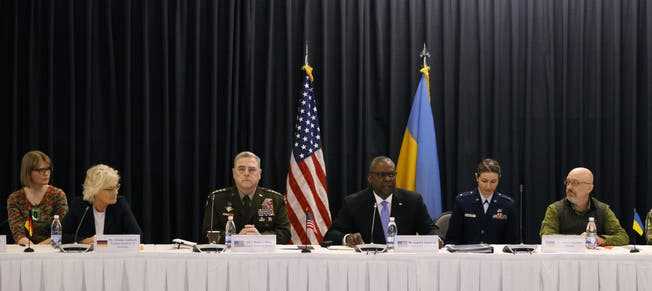A contact group for Ukraine was set up at the meeting of western defense ministers at the Ramstein air base. “Russia’s talk of nuclear war” is what the US Secretary of Defense describes as dangerous.
In Ramstein, the USA is organizing military aid for Ukraine: Secretary of Defense Lloyd Austin (3rd from right), his Ukrainian colleague Olexi Resnikov (right), German Secretary of Defense Christine Lambrecht (2nd from left) and US Chief of Staff Mark Milley (3rd from left)
Defense ministers from more than 30 Western countries discussed Tuesday, under American auspices, Ukraine’s armament in the war against Russia. A contact group for self-defense of Ukraine was established. It is to meet monthly.
A number of non-NATO countries, including Finland, Sweden and Georgia, as well as Japan and South Korea from Asia, also took part in the meeting at the American Ramstein Air Force Base near Frankfurt. High-ranking representatives of NATO and the EU were also present.
A turning point in Western security policy
According to US Secretary of Defense Lloyd Austin, the task of the conference is to give Ukraine the means to defeat Russia. “Ukraine clearly believes it can win – and we all believe that too.” In this conflict, Russia must be weakened militarily to such an extent that it no longer poses a threat to its neighbors in the future, Austin said the previous evening.
A Pentagon spokesman stressed that the talks were about more than organizing arms shipments. A plan for a “defense relationship” is now being developed between Ukraine and its international partners. The contact group should help with this.
At the same time, the spokesman made it clear that what was taking place in Ramstein was not a NATO ministerial meeting. Accordingly, there will be no NATO resolutions there either. A consensus of all members would be necessary anyway.
Allianz is trying not to expose itself more than necessary in the conflict between Russia and Ukraine. Arms aid from member states is presented as a bilateral matter, even if NATO plays an important role in its coordination.
The Ramstein meeting underscores a shift in Western security policy in the conflict. Until the Russian army was defeated in front of Kyiv, most countries, including the Americans, were cautious about supplying weapons. It was important to note that these were primarily so-called defensive weapons such as anti-tank and anti-aircraft missiles.
The Ukrainian demand to also supply heavy weapons was often explicitly rejected. This began to change with the defeat of the Russian army in northern Ukraine and the movement and regrouping of troops to the east. Heavy weapons for the armored and artillery troops are now also being transported into the country at an increasing rate.
There are two reasons for this. For one thing, Ukraine must now prepare for a field battle on the plains. A long-distance battle of attrition is expected, fought primarily with artillery and rocket launchers.
Kyiv is therefore receiving self-propelled howitzers and towed artillery pieces from various European countries. For the mechanized counterattack, the Ukrainian army also needs battle tanks, armored personnel carriers, but also anti-aircraft guns and combat helicopters. All of this should be provided. Only the delivery of fighter jets still seems to be taboo.
Military necessity is one thing. The other is the new assessment of Russia’s strength in the West. The defeat in the advance on Kyiv, the sinking of the flagship of the Black Sea Fleet and the great loss of human life and military equipment by the Russians make a stalemate between attackers and defenders seem realistic.
As a result, the sense of threat in the West, which was still strong in the first weeks of the war, has also diminished. And finally, the particularly brutal warfare of the Russians, for example in Mariupol and Bucha, has outraged the public in Western countries. Even hesitant politicians are now giving in to your pressure. Most recently in Berlin, which, according to the German Defense Minister, wants to send anti-aircraft tanks to Ukraine.
Russia warns of nuclear escalation
Moscow is responding to the West’s increased involvement with a threatening gesture. Foreign Minister Sergei Lavrov warned on a Russian broadcaster on Monday that the war could escalate. NATO is at war with Russia, with Ukraine as the West’s proxy. There is now a significant risk of nuclear war: “The danger is serious, real.” The situation is more dangerous than in the Cold War. After the Cuban Missile Crisis in 1962, when the USA and the Soviet Union came close to an exchange of nuclear blows, rules of conduct were drawn up. But in the international handling of nuclear weapons, only a few rules are left.
Lavrov seems to be responding to the argument that there were countless proxy conflicts during the Cold War without the superpowers considering nuclear escalation. In the interview, the Russian finally softened his words by saying that Moscow would do everything it could to prevent a nuclear war. He wants to continue negotiations with President Zelensky and regrets that the Americans are not interested in talks. He expressly adhered to the Russian war goal of a so-called demilitarization of the Ukraine.
